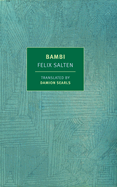
For decades now, the Walt Disney film version of Felix Salten's Bambi has broken young viewers' hearts as they are forced to confront life's harsh realities through the death of young Bambi's mother. Though this moment is tragic, it is not the emotional crux of the story in Austrian author Salten's original 1922 text. Instead, the lens widens, deepening readers' understanding of the forest as an interconnected web of life. This fresh translation from the German by Damion Searls highlights the relationship between human behaviors and the destruction of the wilderness. Salten makes the loss of Bambi's mother feel natural, whereas the removal of the old oak is depicted as raw, rough and unnecessary: "All of us who lived there had to feel, and watched how He bit through the old oak with a gigantic twinkling tooth. The tree screamed from its wound, it was so loud, and it kept screaming, and the tooth was screaming too.... It was horrible to hear. Then the poor beautiful tree toppled over." This, too, will break hearts.
Salten's classic is suitable for young readers but would also be appreciated by adults, especially those who are drawn to stories that put human notions and ideals in their place--that is, on the edges instead of at the center of everything. As Bambi grows from doting fawn to independent deer, readers will recognize an unexpected coming-of-age story that will feel right at home in contemporary literature. Searls's translation is beautiful, lingering on vivid descriptions in stunning sentences. --Sara Beth West, freelance reviewer and librarian

